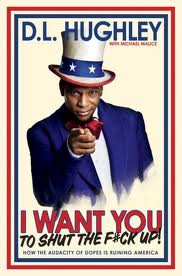I promised y’all we’d continue with our youth soccer/club sports theme and, having just started D. L. Hughley’s new book, I Want You to shut the Fuck Up: How the Audacity of Dopes is Ruining America,” this seemed to be a good time to do just that. 
In this semi-autobiographical tale, Hughley laments the way we’re raising our children, specifically, how we try to insulate them from any pain and do our very best to make sure they believe the world revolves around them. We no longer let our children learn from experience.
All I can say is Hughley must’ve been a Tri-Cities Soccer Association coach.
As I continue to process that four-year coaching experience, it’s still hard to digest the parents who believed their kid was a soccer star when he was marginally talented at best. The irony is, there’s nothing wrong with being a role player and, considering we can’t all be stars, it’s a really important lesson to learn.
So I’ve been wondering what’s gonna happen to those kids when their parents can no longer stave off harsh reality and the mediocre chickens finally come home to roost. Then I saw it firsthand.
Now, I’m going to fictionalize this a bit because I don’t want this young man to have to deal with any more pain than he’s already dealing with. After all, the blame for this particular brand of BS always lies with the parents and not the children. Most of us are all too happy to take something for nuthin’.
There was this boy in my old Geneva neighborhood who excelled at a specific sport. In fact his parents were so wrapped up in his “potential” that their “encouragement” included consistently telling him how great he was and never saying no to anything.
As you might imagine, it was the other neighborhood parents who had to set limits because this kid thought the sun shone only on him.
Finally, at or about the high school level, his parents picked up and moved to another state known for developing athletes in that particular sport. That’s the last I’d heard of this family until this summer.
I was waiting in line in a local store when the young clerk addressed me by name. It was this kid who had to be about 23 or 24 by now. We exchanged pleasantries, talked about the old neighborhood and laughed a bit.
But after I finally recognized him, what struck me was the thousand yard stare and the sense of defeat he exuded. There’s absolutely nothing wrong a clerical job, but this wasn’t how his life was supposed to turn out. He was going to be the one to buck the 1 in 250,000 odds and make it to the pros.
The fall had to be long and precipitous.
I want to be clear there was no joy in this revelation. As I left the store, I was overcome with a vast sense of sadness. Through not fault of his own, this “kid” bought into the patently false reality his parents had created for him. And now he’s left to deal with the fallout of it crashing down on him – not them.
And the scary thing is, some of my soccer parents are far worse.
We need to stop living vicariously through our progeny and let our children experience failure because that’s the only way they can truly understand the concept of success. We are literally damning our children with faint praise.
You think we have school/theater/church/fast food shootings now? Just wait till this generation realizes what D. L. Hughley’s mother told him, “Don’t nobody owe you shit.”




The sad part is: this boy could have been very successful in some other form of competition, or in some other part of the education process, if his parents had been realistic enough to let his limitations be seen in this sport, so he could pursue other avenues to success. He may have become a real champion in some other sport, or an academic success in some field. Instead, they wasted his talents and time in a field in which he could not ‘win,” and this is the real tragedy.
Denny,
The thing is, I understand he was pretty good, but as we all know, making the pros is another thing entirely.
And the problem with kids who are way above their peers is, when they actually have to work to succeed, the don’t know how to handle it. This is why the best baseball managers are former players who had to struggle to stay in the big leagues.
Tonly LaRussa for example.